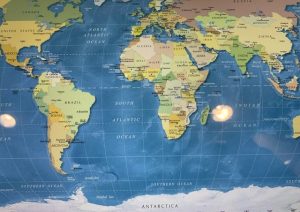“It is an illusion to think that more comfort means more happiness. Happiness comes of the capacity to feel deeply, to enjoy simply, to think freely, to risk and to be needed – Storm Jameson
The Revenge of Geography by Robert Kaplan, a fascinating book, posits that though technology is making the world “flatter, much of geopolitics and macro human behavior is still defined by Geography. One of his points, one also made more subtly by Jared Diamond in Guns Germs and Steel, is that few historically significant cultures have ever developed between the equator and latitudes 22 North or South. He asserts that life in the tropics is simply too easy to create the need for people to band together for mutual survival. And this coming together to face shared challenges is what is needed to develop complex civilizations. He also notes that great civilizations don’t develop above 50 degrees N or below 50 degrees south because conditions are simply too harsh to do more than merely survive.
Without debating geographical determinism or putting value judgments on what defines “historically significant” I want to build on his theories. Civilization flourishes in temperate zones. The hypothesis is that where weather is more seasonal, one must intentionally plant crops rather than harvest fruit. One must figure out ways to stay warm in winter and find light for long winter evenings. People must work together to survive and this focus on collaboration and innovation fosters the sharing of ideas which moves a civilization forward.

Like life in the tropics, in the book, How Children Succeed, Paul Tough argues that as parents, we have made our upper middle-class children so comfortable that we are actually inhibiting their success. If civilizations need stressors to develop more fully, perhaps giving our children lives filled with too much comfort and doing too much for them is doing them a disservice, though it’s the last thing we intend. Resilience: picking oneself up from failure, and optimism, possessing a belief in your ability to affect your own outcomes are characteristics of successful people. If our kids rarely experience failure or adversity, we slow their advance to successful adulthood.
Kaplan says a trained geographer can look at the natural attributes of the United States compared to the rest of the planet and instantly understand why it’s the dominant global player. The US has more and better navigable rivers and natural harbors than other countries. With small, easily traversed East Coast Mountains, two oceans and fertile plains accessed by the Mississippi River, we have won the global geography bee! He goes even further to say that because we are protected by two oceans and naturally more secure, inhabitants of the United States were automatically more receptive to the concept of democracy than say a country like Russia where residents would be more inclined towards the protective rule of a despot because of the constant threat of invasion across its flat and open steppes. We are seeing this play out in Russia today as their geographic propensity to accept a despots leadership allowed the opportunity for Putin to claim and centralize power.
While we are watching a level of resilience exhibited by our Ukrainian friends that is unprecedented in modern time and we wish was not necessary, no one is advocating that facing an advancing Russian army, would be a type of resilience we should seek out for our kids, if avoidable.
There are some ways, however, we can encourage our American kids to embrace a life that is less comfortable. First, it’s begins with us as parents, using our role modeling to embrace both physical and mental challenges. We need to carefully use language that praises our children when they take risks and challenge themselves. They should know how proud we are when they embrace that which is uncomfortable in their lives, whether they succeed or fail.

It can begin with an embrace of family puzzles and mental changes, a daily wordle, crossword or sudoku. And a celebration, when we succeed at more difficult challenges but also an embrace of situations when our kids try hard but ‘don’t succeed. It’s talking about strategies that help us succeed, embracing perseverance and “stick to it ivness” and not complaining ourselves when conditions are hard, unexpected, or uncomfortable. If we avoid challenges, then we give our kids a green light to do the same.
It’s hard to ignore our natural desire to protect our children from adversity and subtly celebrate rainy soccer games, challenging homework that makes one do independent research, dig deep, and think. It’s about not giving our kids the answers they seek but giving hints and encouragement to solve problems on their own! It’s about embracing challenging family day hikes, and ski trips with subzero weather and icy conditions. As parents, we may think that our advanced age, wisdom, and experience gives us the privilege to avoid unpleasant situations, but we may do better by engineering some discomfort for our kids so they can embrace the difficult situations they are sure to find in life.
As a family, we did a fair amount of second and third world travel when our kids were young. I distinctly remember a missed bus connection in scorching Nicaragua heat and us walking together as a family with backpacks on the side of the road, uphill about two miles to get to a taxi stand. It was a miserable situation, especially for a vacation, but our role modeling kept the kids from complaining and after that, we found they were proud of their resilience, and it gave them a framework to face other situations in life with a newfound ability to take risks because they have thrived through discomfort before. We refer to that situation and other unpleasant situations we have faced together often and celebrate overcoming adversity when we can! I know my kids have the mettle to “suck it up” when things don’t go as planned, and I feel that is a true strength we have given them.
John R Dockendorf is a hospitality and outdoor recreation consultant based in Hood River Oregon and Hendersonville, NC